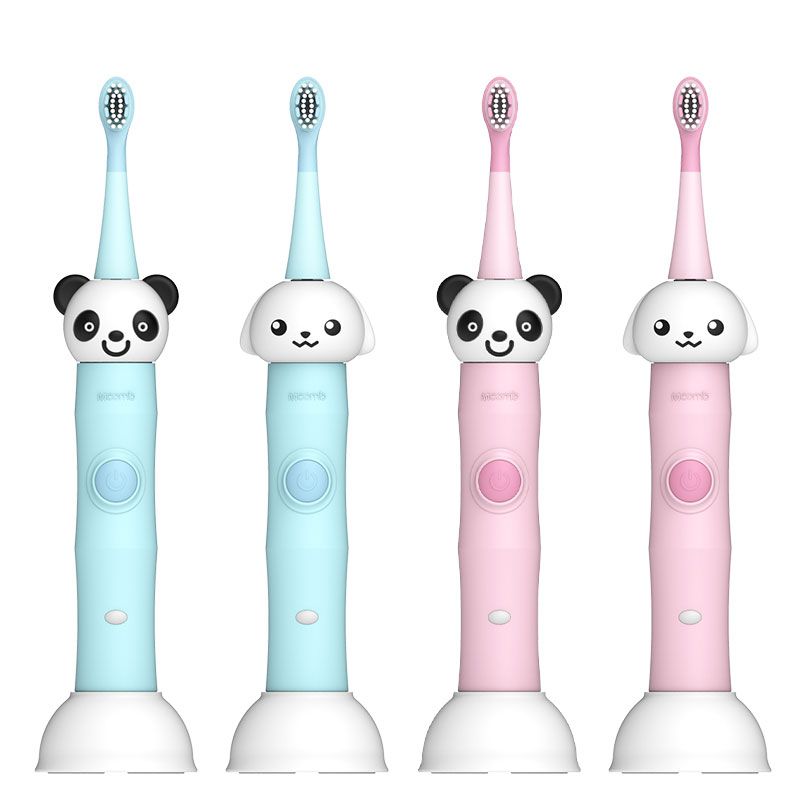Contact :
Name:Brittany Zhang
E-mail:brittanyl1028@gmail.com
Whatsapp:+0086 18598052187
While kids may not love brushing their teeth, It’s incredibly important to help them build good oral hygiene habits early — even if those baby teeth are going to be given to the tooth fairy one day. Electric toothbrushes not only make brushing easier and more thorough for grown-ups, but smaller, simpler versions can help kids brush better.
Everything you need to know about electric toothbrushes for kids
No matter the age, research shows that brushing your teeth for a full two minutes twice a day is incredibly important — something we found out while researching and testing to find the best electric toothbrushes overall. This leads to better plaque removal and can help avoid cavities. The British Dental Association also recommends brushing for two minutes, twice a day, and since “baby teeth have thinner and often less strong enamel,” protecting your teeth — even at a young age — is not something to omit from your daily routine.
Of course a manual toothbrush can get the job done — and the American Dental Association states that “Both manual and powered toothbrushes are effective at removing plaque” — but a kids electric toothbrush has a few added features that, if used correctly, can help kids get in the right amount of brushing. Between built-in timers, 30-second quadrant reminders, multiple modes and fun apps, as long as used correctly, an electric toothbrush can help leave your child’s teeth sparkly clean.
Dr. Talia Miller, a pediatric dentist at Norwell Pediatric Dentistry and Orthodontics in Norwell, Massachusetts, told us that the built-in timers make electric toothbrushes a good choice for kids who have a hard time brushing for the full two minutes dental health experts recommend, have a hard time getting close to gum line as recommended, or need more help reaching the back of the mouth or brushing with braces. Dr. Miller emphasizes that an electric toothbrush isn’t a solution in itself, and takes care and adult supervision to use correctly. Some kids, she has observed, have more trouble reaching the back of their mouths with an electric toothbrush, and it may take some effort to “reach back to the molars to successfully remove plaque.” She’s also found that “some younger children might not like the vibration,” and doesn’t recommend an electric toothbrush for kids under three years old.
Dr. Anne Hertzberg, a pediatric dentist at Chestnut Dental Associates in Needham, Massachusetts, also underscores the importance of teaching proper use and supervising younger children as they learn, going to explain that one issue with electric toothbrushes is that since they do the work for you, children can “tend to get lazy and don’t move the bristles over all of the surfaces of the teeth and often miss brushing at the gumline, which is the first place plaque forms.”
Amy King, a registered dental hygienist at Chestnut Dental Associates, generally recommends electric toothbrush for older children, 14 years and up, who are already able to take care of their own oral hygiene. She does finds it easier to brush someone else’s teeth with an electric toothbrush, and does recommend electric toothbrushes to parents who handle the brushing for a child who’s too young or otherwise unable to brush on their own.
This all means that before you hand an electric toothbrush over to your child and as you teach them to use it, it’s important to ensure that good brushing habits are kept intact, which includes soft circles over all surfaces, for the appropriate amount of time with gentle pressure.
During our testing, we found a few specific functions to be extremely important during our brushing sessions. Below is a description of each functionality and options to look for when considering a toothbrush.
Built-in timer
Brushing for a full two minutes is extremely important for everyone, especially kids. All three toothbrushes we tested featured a built-in two minute timer, which helps children truly brush for the recommended time frame. If left to their own devices, there’s a good chance that a child brushes for a split second and hangs up the toothbrush — making a timer imperative. Each toothbrush tested also offers an alert every 30 seconds — either by a different type of vibration or sound — to remind the child to move to the next quadrant of their mouth. When speaking to Dr. Mark Wolff, professor of restorative dentistry at the University of Pennsylvania, we were told that “kids rarely brush too long or too hard, so the timers on the brushes are probably the most important [feature].
Post time: Oct-30-2023








